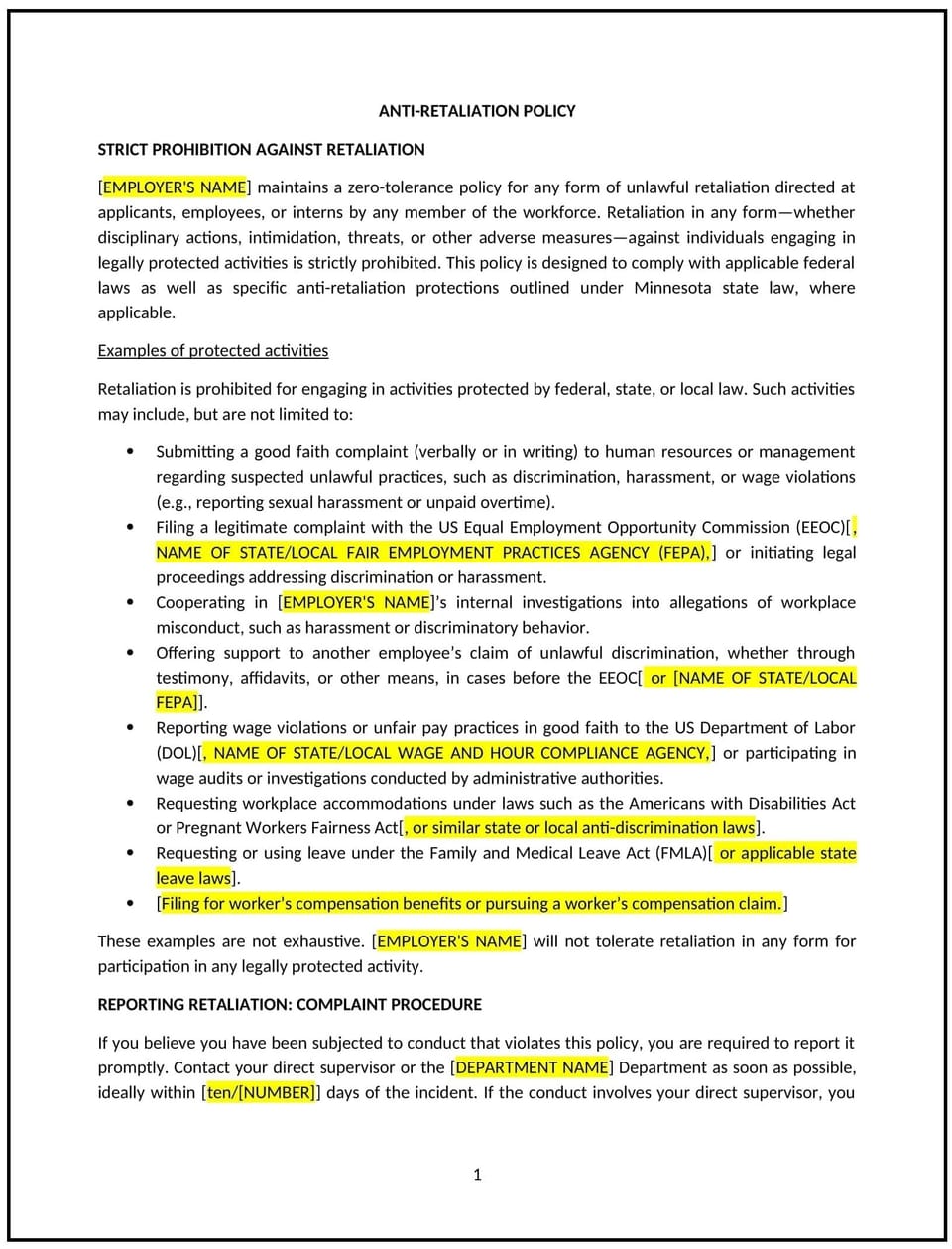Anti-retaliation policy (Minnesota): Free template

Anti-retaliation policy (Minnesota)
This anti-retaliation policy is designed to help Minnesota businesses create a workplace where employees feel safe reporting concerns without fear of retaliation. Whether businesses are addressing workplace complaints, whistleblowing, or ethical violations, this policy provides a framework to protect employees who speak up. Tailored to Minnesota’s legal and cultural environment, this policy emphasizes fairness, transparency, and accountability.
By implementing this policy, businesses in Minnesota can foster trust, encourage open communication, and promote a culture of integrity and respect.
How to use this anti-retaliation policy (Minnesota)
- Define retaliation: Clearly outline what constitutes retaliation, including examples such as demotion, termination, harassment, or other adverse actions against employees who report concerns.
- Establish reporting procedures: Provide employees with clear, confidential channels to report retaliation or concerns about workplace behavior.
- Train employees and managers: Educate staff on recognizing and preventing retaliation, emphasizing the importance of protecting employees who report issues.
- Investigate complaints promptly: Ensure all reports of retaliation are taken seriously and investigated thoroughly and impartially.
- Enforce consequences: Outline disciplinary actions for violations of the policy, ensuring consistency and fairness.
- Promote a supportive culture: Encourage open communication and assure employees that their concerns will be addressed without fear of retaliation.
- Review and update the policy: Regularly assess the policy’s effectiveness and make adjustments as needed to reflect changes in laws or workplace dynamics.
- Communicate the policy: Share the policy with employees during onboarding and through regular reminders, such as emails or training sessions.
Benefits of using this anti-retaliation policy (Minnesota)
This policy offers several advantages for Minnesota businesses:
- Protects employees: A clear anti-retaliation policy helps create a safe environment for employees to report concerns without fear of adverse consequences.
- Encourages transparency: Employees are more likely to speak up about issues when they trust that retaliation will not occur.
- Reduces legal risks: Addressing retaliation proactively can minimize the risk of lawsuits and regulatory penalties.
- Builds trust: Demonstrating a commitment to protecting employees fosters trust and loyalty within the workforce.
- Supports compliance: The policy helps businesses align with Minnesota state laws and federal regulations, such as whistleblower protections.
- Improves workplace culture: Promoting fairness and accountability contributes to a positive and respectful work environment.
- Strengthens reputation: A strong anti-retaliation stance enhances the business’s reputation among employees, customers, and the community.
Tips for using this anti-retaliation policy (Minnesota)
- Communicate the policy effectively: Share the policy with employees during onboarding and through regular training sessions.
- Provide anti-retaliation training: Educate employees and managers on recognizing and preventing retaliation.
- Encourage reporting: Create a safe and confidential channel for employees to report retaliation or concerns about workplace behavior.
- Investigate complaints promptly: Ensure all reports are taken seriously and addressed in a timely and impartial manner.
- Be transparent: Share updates on policy enforcement and progress in addressing retaliation with employees to build trust.
- Review the policy periodically: Update the policy as needed to reflect changes in laws, workplace dynamics, or industry standards.
Q: Why should Minnesota businesses adopt an anti-retaliation policy?
A: Businesses should adopt this policy to protect employees who report concerns, encourage transparency, and reduce legal risks.
Q: What behaviors are considered retaliation under this policy?
A: Retaliation includes adverse actions such as demotion, termination, harassment, or other negative treatment against employees who report concerns.
Q: How should businesses handle retaliation complaints?
A: Businesses should investigate complaints promptly, thoroughly, and impartially, and take appropriate action to address the issue.
Q: What training should businesses provide to employees?
A: Businesses should educate employees on recognizing and preventing retaliation, as well as the importance of protecting employees who report issues.
Q: How can businesses prevent retaliation against employees who report concerns?
A: Businesses should enforce strict anti-retaliation measures and ensure employees feel safe reporting concerns without fear of consequences.
Q: How often should the policy be reviewed?
A: The policy should be reviewed annually or as needed to reflect changes in laws, workplace dynamics, or industry standards.
Q: What role do managers play in enforcing this policy?
A: Managers should lead by example, address inappropriate behavior promptly, and ensure all employees understand and adhere to the policy.
This article contains general legal information and does not contain legal advice. Cobrief is not a law firm or a substitute for an attorney or law firm. The law is complex and changes often. For legal advice, please ask a lawyer.


